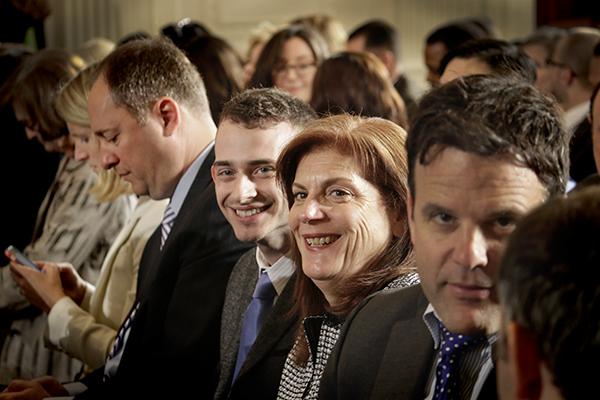Updated: March 24, 2015 at 2:33 p.m.
University President Steven Knapp’s response to another swastika found in International House last week both broke the news and answered questions before they could be asked.
Communication experts say Knapp’s nearly 400-word statement was powerful and detailed. The release illustrates GW’s broader strategy to jump in front of negative press to control the message.
“We always tell our clients that they need to get out in front of these stories as quickly as they possibly can and tell the truth, tell everything they know, and tell it first,” said Howard Fencl, the vice president at crisis communication firm Hennes Paynter Communications.
That proactive approach, known as crisis communication, has come into focus during Knapp’s nearly eight-year tenure. The head of GW’s communications team, Vice President for External Relations Lorraine Voles, came to the University with two decades of crisis communications experience after working for then-Sen. Hillary Clinton’s 2006 reelection campaign and her presidential bid. Voles also worked for mortgage lending company Fannie Mae during the financial crisis.
“If a mistake is made or something is said that is wrong, [you have] to correct that,” Voles said at a December interview focused on GW’s media strategy. “The hardest thing is in a crisis situation, people get really nervous and start talking about things as if they’re facts. That’s when you have to take a step back.”
Voles has transformed the messaging strategy during her seven years at GW, bridging the marketing, media and governmental relations departments and hiring staff with higher levels of experience. The office has led the response to eight student deaths since January 2014 and helped the University weather two different admissions scandals. Voles declined a request to be interviewed for this story.
“My opinion is that the media department when I came in was that it was very reactive,” Voles said during the December interview. “But I came from a different background, and I think I was brought in to much more aggressively promote the University and the faculty.”
In last week’s statement, Knapp said officials were “shocked” and “dismayed” to see the swastika posted, the second time the symbol has appeared in the same residence hall this semester. He also laid out the University’s plan to involve the Metropolitan Police Department and start an education initiative about hate symbols – details that experts say are critical to building trust between administrators and students and their parents.
Gerard Braud of Braud Communications said it is key that students trust their school to release accurate information as quickly as possible – especially during a crisis. He said officials can build that trust by being “proactive” and telling their own bad news first.
“There is less negative attention and more trust when an institution is willing to tell its own bad news before someone else tells it,” Braud said.
Braud said Knapp’s statement was “good on the details” and successfully struck a balance between calming and providing necessary information.
“A statement like this has to contain an appropriate level of outrage or disappointment by the president, but it has to be careful not to overstep the bounds before all of the information is known,” Braud said.
When three swastikas were drawn on walls in International House three weeks ago, a national Jewish rights group asked Knapp to formally apologize for what it called an insufficient response to the incident.
Max Cardin, an executive board member of the L’Chaim Jewish Students Group, said Knapp’s previous response was “inadequate in timing,” but that he hasn’t heard any criticism of the president’s most recent statement.
Jamie Weiss, a sophomore who has been involved with GW Chabad since the fall of her freshman year, said she thought Knapp’s statement last week better recognized “that it’s a bigger issue than they did that last time.”
“It’s better hearing it from the University. Last time, I found out about it on Facebook,” Weiss said. “It seemed like they’re taking it more seriously, which is nice to read about. It seems like they’re taking better action.”
In the fall, crisis communication experts criticized Knapp’s response to a sexual assault reported in a Greek townhouse, saying he missed the chance to start a campus-wide conversation about sexual violence and prevention. Instead, Knapp focused his statement on former University President Stephen Joel Trachtenberg, who earlier that week said women should drink less to avoid sexual assault, which set off a media firestorm.
Jason Maloni, the senior vice president of Levick Communications, said many universities have sped up their responses to negative news events and crises as social media has made it more difficult to keep up with the news cycle.
Maloni added that it is particularly important to get ahead of negative news when it’s about race and culture “because those are the hot-button issues of social media.”
“Issues have a way of maturing and bubbling up into the broader national dialogue, and today there is much less time before that happens,” Maloni said. “There’s a greater magnifying glass on universities today than there has been at any time in history.”
Colleen Murphy contributed reporting.
This post was updated to reflect the following correction:
The Hatchet incorrectly reported that, before she came to GW, Vice President for External Relations Lorraine Voles worked for Hillary Clinton’s 2006 presidential campaign. Voles advised Clinton on the then-senator’s 2006 reelection campaign and her presidential bid. We regret this error.







